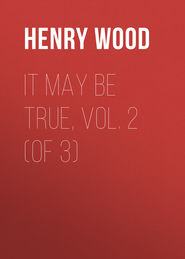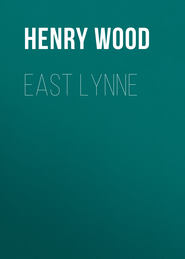По всем вопросам обращайтесь на: info@litportal.ru
(©) 2003-2024.
✖
Elster's Folly
Настройки чтения
Размер шрифта
Высота строк
Поля
Such a letter! To read it one might have thought Mr. William Gum had gone out under the most favourable auspices. He was in Australia; had gone up to seek his fortune at the gold-diggings, and was making money rapidly. In a short time he should refund with interest the little sum he had borrowed from Goldsworthy and Co., and which was really not taken with any ill intention, but was more an accident than anything else. After that, he should accumulate money on his own score, and—all things being made straight at home—return and settle down, a rich man for life. And she—his mother—might rely on his keeping his word. At present he was at Melbourne; to which place he and his mates had come to bring their acquired gold, and to take a bit of a spree after their recent hard work. He was very jolly, and after a week's holiday they should go back again. And he hoped his father had overlooked the past; and he remained ever her affectionate son, William Gum.
The effect of this letter upon Mrs. Gum was as though a dense cloud had suddenly lifted from the world, and given place to a flood of sunshine. We estimate things by comparison. Mrs. Gum was by nature disposed to look on the dark side of things, and she had for the whole year past been indulging the most dread pictures of Willy and his fate that any woman's mind ever conceived. To hear that he was in life, and well, and making money rapidly, was the sweetest news, the greatest relief she could ever experience in this world.
Clerk Gum—relieved also, no doubt—received the tidings in a more sober spirit; almost as if he did not dare to believe in them. The man's heart had been well-nigh broken with the blow that fell upon him, and nothing could ever heal it thoroughly again. He read the letter in silence; read it twice over; and when his wife broke out into a series of rapt congratulations, and reproached him mildly for not appearing to think it true, he rather cynically inquired what then, if true, became of her dreams.
For Mrs. Gum was a dreamer. She was one of those who are now and again visited by strange dreams, significant of the future. Poor Mrs. Gum carried these dreams to an excess; that is, she was always having them and always talking about them. It had been no wonder, with her mind in so miserable a state regarding her son, that her dreams in that first twelve-month had generally been of him and generally bad. The above question, put by her husband, somewhat puzzled her. Her dreams had foreshadowed great evil still to Willy; and her dreams had never been wrong yet.
But, in the enjoyment of positive good, who thinks of dreams? No one. And Mrs. Gum's grew a shade brighter, and hope again took possession of her heart.
Two years rolled on, during which they heard twice from Willy; satisfactory letters still, in a way. Both testified to his "jolly" state: he was growing rich, though not quite so rapidly as he had anticipated; a fellow had to spend so much! Every day he expected to pick up a nugget which would crown his fortune. He complained in these letters that he did not hear from home; not once had news reached him; had his father and mother abandoned him?
The question brought forth a gush of tears from Mrs. Gum, and a sharp abuse of the post-office. The clerk took the news philosophically, remarking that the wonder would have been had Willy received the letters, seeing that he seemed to move about incessantly from place to place.
Close upon this came another letter, written apparently in haste. Willy's "fortune" had turned into reality at last; he was coming home with more gold than he could count; had taken his berth in the good ship Morning Star, and should come off at once to Calne, when the ship reached Liverpool. There was a line written inside the envelope, as though he had forgotten to include it in the letter: "I have had one from you at last; the first you wrote, it seems. Thank dad for what he has done for me. I'll make it all square with him when I get home."
This had reference to a fact which Calne did not know. In that unhappy second visit of Clerk Gum's to London, he did succeed in appeasing the wrath of Goldsworthy and Co., and paid in every farthing of the money. How far he might have accomplished this but for being backed by the urgent influence of old Lord Hartledon, was a question. One thing was in his favour: the firm had not taken any steps whatever in the matter, and those handbills circulated at Calne were the result of a misapprehension on the part of an officious local police-officer. Things had gone too far for Goldsworthys graciously to condone the offence—and Clerk Gum paid in his savings of years. This was the fact written by Mrs. Gum to her son, which had called forth the line in the envelope.
Alas! those were the last tidings ever received from Willy Gum. Whilst Mrs. Gum lived in a state of ecstacy, showing the letter to her neighbours and making loving preparations for his reception, the time for the arrival of the Morning Star at Liverpool drew on, and passed, and the ship did not arrive.
A time of anxious suspense to all who had relations on board—for it was supposed she had foundered at sea—and tidings came to them. An awful tale; a tale of mutiny and wrong and bloodshed. Some of the loose characters on board the ship—and she was bringing home such—had risen in disorder within a month of their sailing from Melbourne; had killed the captain, the chief officer, and some of the passengers and crew.
The ringleader was a man named Gordon; who had incited the rest to the crime, and killed the captain with his own hand. Obtaining command of the ship, they put her about, and commenced a piratical raid. One vessel they succeeded in disarming, despoiling, and then leaving her to her fate. But the next vessel they attacked proved a more formidable enemy, and there was a hand-to-hand struggle for the mastery, and for life or death. The Morning Star was sunk, with the greater portion of her living freight. A few, only some four or five, were saved by the other ship, and conveyed to England.
It was by them the dark tale was brought. The second officer of the Morning Star was one of them; he had been compelled to dissemble and to appear to serve the mutinous band; the others were innocent passengers, whose lives had not been taken. All agreed in one thing: that Gordon, the ringleader, had in all probability escaped. He had put off from the Morning Star, when she was sinking, in one of her best boats; he and some of his lawless helpmates, with a bag of biscuit, a cask of water, and a few bottles that probably contained rum. Whether they succeeded in reaching a port or in getting picked up, was a question; but it was assumed they had done so.
The owners of the Morning Star, half paralyzed at the news of so daring and unusual an outrage, offered the large reward of five hundred pounds for the capture of George Gordon; and Government increased the offer by two hundred, making it seven in all.
Overwhelming tidings for Clerk Gum and his wife! A brief season of agonized suspense ensued for the poor mother; of hopes and fears as to whether Willy was amongst the remnant saved; and then hope died away, for he did not come.
Once more, for the last time, Clerk Gum took a journey, not to London, but to Liverpool. He succeeded in seeing the officer who had been saved; but he could give him no information. He knew the names of the first-class passengers, but only a few of the second-class; and in that class Willy had most likely sailed.
The clerk described his son; and the officer thought he remembered him: he had a good deal of gold on board, he said. One of the passengers spoke more positively. Yes, by Clerk Gum's description, he was sure Willy Gum had been his fellow-passenger in the second cabin, though he did not recollect whether he had heard his name. It seemed, looking back, that the passengers had hardly had time to become acquainted with each other's names, he added. He was sure it was the young man; of very light complexion, ready and rather loose (if Mr. Gum would excuse his saying so) in speech. He had made thoroughly good hauls of gold at the last, and was going home to spend it. He was the second killed, poor fellow; had risen up with a volley of oaths (excuses begged again) to defend the captain, and was struck down and killed.
Poor Jabez Gum gasped. Killed? was the gentleman sure? Quite sure; and, moreover, he saw his body thrown overboard with the rest of the dead. And the money—the gold? Jabez asked, when he had somewhat recovered himself. The passenger laughed—not at the poor father, but at the worse than useless question; gold and everything else on board the Morning Star had gone down with her to the bottom of the sea.
A species of savage impulse rose in the clerk's mind, replacing his first emotion of grief; an impulse that might almost have led him to murder the villain Gordon, could he have come across him. Was there a chance that the man would be taken? he asked. Every chance, if he dared show his face in England, the passenger answered. A reward of seven hundred pounds was an inducement to the survivors to keep their eyes open; and they'd do it, besides, without any reward. Moreover—if Gordon had escaped, his comrades in the boat had escaped with him. They were lawless men like himself, every one of them, and they would be sure to betray him when they found what a price was set upon his capture.
Clerk Gum returned home, bearing to his wife and Calne the final tidings which crushed out all hope. Mrs. Gum sank into a state of wild despair. At first it almost seemed to threaten loss of reason. Her son had been her sole idol, and the idol was shattered. But to witness unreasonably violent grief in others always has a counteracting effect on our own, and Mr. Gum soothed his sorrow and brought philosophy to his aid.
"Look you," said he, one day, sharply to his wife, when she was crying and moaning, "there's two sides to every calamity,—a bright and a dark 'un;" for Mr. Gum was not in the habit of treating his wife, in the privacy of their domestic circle, to the quality-speech kept for the world. "He is gone, and we can't help it; we'd have welcomed him home if we could, and killed the fatted calf, but it was God's will that it shouldn't be. There may be a blessing in it, after all. Who knows but he might have broke out again, and brought upon us what he did before, or worse? For my part, I should never have been without the fear; night and morning it would always have stood before me; not to be driven away. As it is, I am at rest."
She—the wife—took her apron from her eyes and looked at him with a sort of amazed anger.
"Gum! do you forget that he had left off his evil ways, and was coming home to be a comfort to us?"
"No, I don't forget it," returned Mr. Gum. "But who was to say that the mood would last? He might have got through his gold, however much it was, and then—. As it is, Nance Gum, we can sleep quiet in our beds, free from that fear."
Clerk Gum was not, on the whole, a model of suavity in the domestic fold. The first blow that had fallen upon him seemed to have affected his temper; and his helpmate knew from experience that whenever he called her "Nance" his mood was at its worst.
Suppressing a sob, she spoke reproachfully.
"It's my firm belief, Gum, and has been all along, that you cared more for your good name among men than you did for the boy."
"Perhaps I did," he answered, by way of retort. "At any rate, it might have been better for him in the long-run if we—both you and me—hadn't cared for him quite so foolishly in his childhood; we spared the rod and we spoiled the child. That's over, and—"
"It's all over," interrupted Mrs. Gum; "over for ever in this world. Gum, you are very hard-hearted."
"And," he continued, with composure, "we may hope now to live down in time the blow he brought upon us, and hold up our heads again in the face of Calne. We couldn't have done that while he lived."
"We couldn't?"
"No. Just dry up your useless tears, Nancy; and try to think that all's for the best."
But, metaphorically speaking, Mrs. Gum could not dry her tears. Nearly two years had elapsed since the fatal event; and though she no longer openly lamented, filling Calne with her cries and her faint but heartfelt prayers for vengeance on the head of the cruel monster, George Gordon, as she used to do at first, she had sunk into a despairing state of mind that was by no means desirable: a startled, timid, superstitious woman, frightened at every shadow.
CHAPTER III.
ANNE ASHTON
Jabez Gum came out of his house in the bright summer morning, missing Mr. Elster by one minute only. He went round to a small shed at the back of the house and brought forth sundry garden-tools. The whole garden was kept in order by himself, and no one had finer fruit and vegetables than Clerk Gum. Hartledon might have been proud of them, and Dr. Ashton sometimes accepted a dish with pleasure.
In his present attire: dark trousers, and a short close jacket buttoned up round him and generally worn when gardening, the worthy man might decidedly have been taken for an animated lamp-post by any stranger who happened to come that way. He was applying himself this morning, first to the nailing of sundry choice fruit-trees against the wall that ran down one side of his garden—a wall that had been built by the clerk himself in happier days; and next, to plucking some green walnuts for his wife to pickle. As he stood on tip-toe, his long thin body and long thin arms stretched up to the walnut-tree, he might have made the fortune of any travelling caravan that could have hired him. The few people who passed him greeted him with a "Good morning," but he rarely turned his head in answering them. Clerk Gum had grown somewhat taciturn of late years.
The time went on. The clock struck a quarter-past seven, and Jabez Gum, as he heard it, left the walnut-tree, walked to the gate, and leaned over it; his face turned in the direction of the village. It was not the wooden gate generally attached to smaller houses in rustic localities, but a very pretty iron one; everything about the clerk's house being of a superior order. Apparently, he was looking out for some one in displeasure; and, indeed, he had not stood there a minute, when a girl came flying down the road, and pushed the gate and the clerk back together.
Mr. Gum directed her attention to the church clock. "Do you see the time, Rebecca Jones?"
Had the pages of the church-register been visible as well as the clock, Miss Rebecca Jones's age might have been seen to be fifteen; but, in knowledge of the world and in impudence, she was considerably older.
"Just gone seven and a quarter," answered she, making a feint of shading her eyes with her hands, though the sun was behind her.
"And what business have you to come at seven and a quarter? Half-past six is your time; and, if you can't keep it, your missis shall get those that can."
"Why can't my missis let me stop at night and clear up the work?" returned the girl. "She sends me away at six o'clock, as soon as I've washed the tea-things, and oftentimes earlier than that. It stands to reason I can't get through the work of a morning."
"You could do so quite well if you came to time," said the clerk, turning away to his walnut-tree. "Why don't you?"
"I overslept myself this morning. Father never called me afore he went out. No doubt he had a drop too much last night."
She went flying up the gravel-path as she spoke. Her father was the man Jones whom you saw at the railway station; her step-mother (for her own mother was dead) was Mrs. Gum's cousin.
She was a sort of stray sheep, this girl, in the eyes of Calne, not belonging very much to any one; her father habitually neglected her, her step-mother had twice turned her out of doors. Some three or four months ago, when Mrs. Gum was changing her servant, she had consented to try this girl. Jabez Gum knew nothing of the arrangement until it was concluded, and disapproved of it. Altogether, it did not work satisfactorily: Miss Jones was careless, idle, and impudent; her step-mother was dissatisfied because she was not taken into the house; and Clerk Gum threatened every day, and his wife very often, to dismiss her.
It was only within a year or two that they had not kept an indoor servant; and the fact of their not doing so now puzzled the gossips of Calne. The clerk's emoluments were the same as ever; there was no Willy to encroach on them now; and the work of the house required a good servant. However, it pleased Mrs. Gum to have one in only by day; and who was to interfere with her if the clerk did not?
Jabez Gum worked on for some little time after eight o'clock, the breakfast-hour. He rather wondered he was not called to it, and registered a mental vow to discharge Miss Becky. Presently he went indoors, put his head into a small sitting-room on the left, and found the room empty, but the breakfast laid. The kitchen was behind it, and Jabez Gum stalked on down the passage, and went into it. On the other side of the passage was the best sitting-room, and a very small room at the back of it, which Jabez used as an office, and where he kept sundry account-books.
"Where's your missis?" asked he of the maid, who was on her knees toasting bread.











